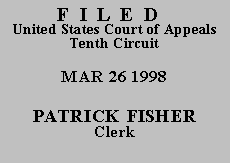

| DELBERT E. NASH,
Plaintiff-Appellant, v. KENNETH S. APFEL, Commissioner of Social Security,(*) Defendant-Appellee. |
|
Plaintiff Delbert E. Nash appeals from an order of the district court affirming the Commissioner's determination that he is not entitled to disability benefits. We affirm.
We review the Commissioner's decision to determine whether his factual findings were supported by substantial evidence in light of the entire record and to determine whether he applied the correct legal standards. See Castellano v. Secretary of Health & Human Servs., 26 F.3d 1027, 1028 (10th Cir. 1994). Substantial evidence is "such relevant evidence as a reasonable mind might accept as adequate to support a conclusion." Id. (quotations omitted). In the course of our review, we may "neither reweigh the evidence nor substitute our judgment for that of the agency." Casias v. Secretary of Health & Human Servs., 933 F.2d 799, 800 (10th Cir. 1991).
Mr. Nash alleged disability due to malignant hypertension, headaches, depression, and fatigue secondary to malignant hypertension. The administrative law judge (ALJ) determined that Mr. Nash was not disabled at step five of the five-step sequential process, see Williams v. Bowen, 844 F.2d 748, 750-52 (10th Cir. 1988), finding that he could perform the full range of sedentary work.
On appeal, Mr. Nash argues that the ALJ's determination is not supported by substantial evidence. He also contends that the ALJ disregarded the treating physician's opinion and the Appeals Council gave no reasons for disregarding new evidence submitted to it. Finally, Mr. Nash asserts that the ALJ failed to consider his nonexertional impairments and thus, erroneously relied on the grids.
Mr. Nash argues that the ALJ's determination that he could perform the full range of sedentary work is not supported by substantial evidence. The record shows that Mr. Nash's hypertension is well controlled when he complies with the prescribed medical regime. However, he admitted, and the record supports his statement, that he does not always fully comply with the regime. Mr. Nash admitted that his headaches are due to his hypertension and stated he had no severe mental disability and had never sought psychiatric treatment. Mr. Nash testified to disabling fatigue, but the record does not show that he ever sought treatment for it. The ALJ's determination that Mr. Nash could perform sedentary work is supported by the record.
Mr. Nash contends that the ALJ disregarded the treating physician's opinion and the Appeals Council gave no reasons for disregarding the new evidence he submitted. The ALJ held that the treating physician's opinion, as expressed in a letter, was not supported by his own records or objective evidence and, thus, could not be accorded the weight usually given a treating physician's opinion. The treating physician wrote two letters in 1994, both concluding that Mr. Nash was unemployable due to his headaches, shortness of breath, and enlarged heart. Mr. Nash submitted another letter from his physician to the Appeals Council in which his physician opined that Mr. Nash was unemployable due either to cardiomegaly or congestive heart failure.
We agree with the ALJ and the Appeals Council that no medical evidence supports the treating physician's opinions. In fact, the last chest x-ray Mr. Nash had showed that his heart was borderline normal in size. Neither the ALJ nor the Appeals Council erred in not crediting the treating physician's opinion that Mr. Nash was disabled. See Castellano, 26 F.3d at 1029 (while Commissioner will give controlling weight to treating physician's opinion if supported by objective medical evidence, treating physician's opinion that claimant is disabled is not dispositive, as final responsibility for determining disability rests with Commissioner).
Finally, Mr. Nash asserts that the ALJ failed to consider his nonexertional impairments of headaches, dizziness, and fatigue and, as a result, erroneously relied on the grids. The record contains no evidence that these impairments affect Mr. Nash's residual functioning. See Glass v. Shalala, 43 F.3d 1392, 1396 (10th Cir. 1994) (grids may be used where non-exertional impairments do not affect residual functioning capacity). The ALJ acted correctly in not departing from the grids.
The judgment of the United States District Court for the Northern District of Oklahoma is AFFIRMED.
Entered for the Court
Circuit Judge
*. Pursuant to Fed. R. App. P. 43(c), Kenneth S. Apfel is substituted for John J. Callahan, former Acting Commissioner of Social Security, as the defendant in this action.
**. This order and judgment is not binding precedent, except under the doctrines of law of the case, res judicata, and collateral estoppel. The court generally disfavors the citation of orders and judgments; nevertheless, an order and judgment may be cited under the terms and conditions of 10th Cir. R. 36.3.